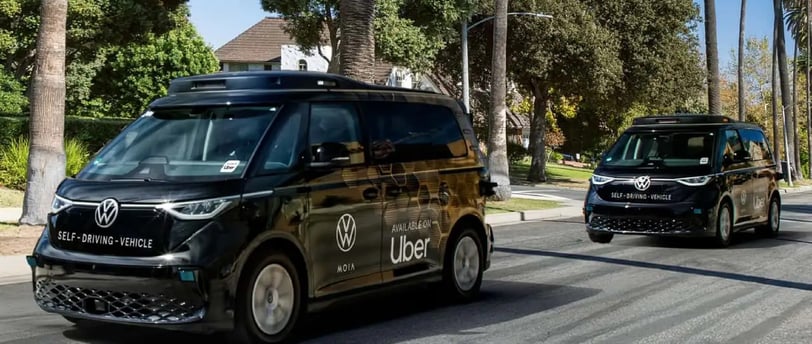Volkswagen and Uber: Autonomous Transportation Agreement
Volkswagen has entered into a strategic agreement with Uber to supply electric and autonomous vans in the US starting in 2026. This partnership highlights the union between sustainability and innovation in urban mobility, marking a significant advancement in the electrification of transportation.
TECHNOLOGY
Team Spark News
4/25/20252 min read


Photo by Volkswagen/Uber
Volkswagen and Uber Partner for Autonomous Transportation in the US
In a move that highlights the future of urban mobility, German automaker Volkswagen (VW) has announced a partnership with Uber to deploy a fleet of electric and autonomous vans in US cities. The collaboration, revealed in April 2025, aims to begin testing as early as 2026, with an initial focus on selected urban markets.
The news was announced by executives from VW's commercial vehicles division (Volkswagen Commercial Vehicles - VWCV), which has been developing autonomous solutions in conjunction with the technology company Mobileye. The vans used will be based on the ID. Buzz model, a 100% electric vehicle already well-known for its retro design and advanced technology.
ID. Buzz to be Adapted for Autonomous Operations with Uber
The ID. Buzz van, an electric model reminiscent of VW's classic Kombi, will be adapted with Level 4 autonomous driving technology developed by Mobileye, allowing the vehicle to operate without human intervention under certain conditions. These vans will be part of Uber's driver network, but in a fully robotic version — an innovation that could transform ride-hailing in the coming years.
The operation will be coordinated by Moia, Volkswagen Group's mobility company, specializing in on-demand services such as ride-sharing. Moia will be responsible for fleet management, maintenance, and vehicle operation, as well as integrating the systems with the Uber platform.
Initial Focus on the US and Future Expansion
According to the CEO of Volkswagen Commercial Vehicles, Carsten Intra, tests with the first vehicles will begin in the United States in 2026. The exact cities have not yet been revealed but are expected to include metropolitan areas with high population density and openness to autonomous vehicles, such as San Francisco, Austin, and Phoenix — regions where Uber is already conducting tests with other similar technologies.
Intra emphasized that the US was chosen for the initial launch because it offers more advanced regulations for autonomous vehicles, as well as a technological infrastructure conducive to the integration of these systems.
The expectation is that, after the launch and successful testing, the technology will be expanded to other markets, including Europe.
Sustainability and Automation: The Pillars of the Future of Mobility
With this partnership, Uber reinforces its commitment to the goal of becoming a fully electric mobility platform by 2030 in developed markets. At the same time, Volkswagen advances its strategy to consolidate itself as a global leader in electric mobility and autonomous transportation services.
"We believe that the combination of autonomous electric vehicles with popular platforms like Uber can accelerate the transition to cleaner, safer, and more efficient cities," said Kai Grünitz, head of development at VWCV.
Uber has been investing in autonomous mobility for years, with ongoing tests with Waymo and other partners. The collaboration with VW represents a new stage, now with the involvement of a traditional automaker, which could offer greater scale and reliability.
Impact on the Transportation Market
This agreement also signals significant changes in the traditional model of urban individual transportation. As autonomous vehicles gain ground, the role of the ride-hailing driver may undergo reformulations, especially in large cities. However, Uber and VW emphasized that this technology will be implemented gradually and responsibly, with a focus on safety and integration with the urban ecosystem.
Source investor.uber/TechCrunch
News
Stay up to date with the latest technological news, Science, Internet, Social Networks and Smartphones.
© 2025. All rights reserved.
